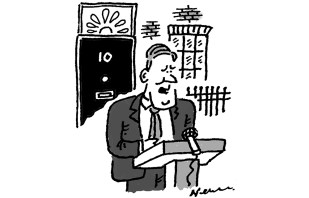After the implosion of Liz Truss’s premiership, Boris Johnson and Rishi Sunak met to discuss which of them should succeed her. Neither wanted to back down to make way for the other. Late one Saturday night, they discussed whether a way could be found that would suit them both. It could not. As they walked out of the room to meet their aides, Johnson joked that Sunak had agreed to be his chancellor (again). Sunak then patted his former boss on the back telling him: see you at the debates.
‘Sparking a needless by-election when we are 15 points behind is close to a defection’
But there were no debates. The following evening, Johnson released a statement saying he would not stand – despite ‘a very good chance that I would be successful’ – given how few votes he had among the still shell-shocked Tory MPs. ‘You can’t govern effectively unless you have a united party in parliament.’ Sunak agreed. Mindful that his own mandate was weak – there had been no Sunak election victory – he felt his only option was to broker a fragile ceasefire with jobs for the various factions. The Tory wars, he feared, were simply adjourned.
The ceasefire has now been abandoned. The wars have begun again. Johnson was desperate for his full resignation honours list to be approved but Sunak demurred, signing off only the names presented to him after vetting – and the two men are once again enemies. Two of Johnson’s allies, Nadine Dorries and Nigel Adams, have announced that they’ll resign their seats along with him, triggering painful by-elections. Against a backdrop of borrowing rates rising to Liz Truss levels (which were, for her, terminal) this amounts to a fairly well-aimed political assassination campaign. Johnson, convinced that Sunak helped to bring him down, is having his revenge.
At first glance, it’s hard to understand why this war has broken out. Tories normally fight each other to advance an agenda or to supplant one leader with another. Johnson’s motivation seems to be more personal. He wants to undermine Sunak for the sake of it. His anger over the Prime Minister refusing to send Dorries into the House of Lords really does seem to be the casus belli. Johnson has an almost Sicilian approach to protecting what few political allies he has. He pushed his friend Evgeny Lebedev into the Lords despite concerns from MI5. ‘We’re moving from guerrilla warfare to open warfare,’ says one senior Tory. ‘Rishi’s critics are trying to take as many steps as possible to hurt him ahead of the next election.’
No sitting MP can enter the Lords – they have to quit the Commons first. But to force constituents into an expensive by-election, as Nadine Dorries has done, because you get offered a better job reeks of political careerism. It’s deeply damaging for any party when its members engage in such self-indulgence. Sunak was never going to make a backroom deal of a promise of a peerage later, so the current row comes down to whether it was No. 10’s job to tell Dorries this or Johnson’s.
For Johnson at least, the timing is perhaps helpful – he quit before the publication of the Privileges Committee report that would have led to a Commons suspension. ‘It was in one way clever,’ says a former cabinet colleague. ‘He got ahead of the committee that would have forced him out anyway. But perversely, he’s weakened himself by going out with such a fury.’ His resignation statement included an attack on the Sunak government.
The trouble for the Johnson camp is that, as one disappointed supporter says, ‘there’s not much of a cause to rally round, just a row about peerages’. A former Johnson aide describes the situation as ‘ludicrous’: ‘The Tory civil war needs to end. A former prime minister can get away with resigning when they choose to, but not with others.’
Indeed, the departure of three MPs at the same time is read by many in the party as treachery. ‘Sparking a needless by-election when we are 15 points behind is close to a defection,’ says one member of the 2019 intake.
The concern in government is not so much an imminent Johnson return as whether the situation will lead to more factions getting ready to fight. Sunak had managed to keep the peace using two arguments: first, that he was a financier who could calm the markets, so mortgage rates would stop surging; second, that it was unite or die. Eight months into his leadership, three of his MPs have chosen the ‘die’ option. At the same time, stubborn inflation and panicked markets means the interest rate which the government is charged in loans is back to Truss-era levels.
The risk is that Tories think the next election as good as lost, so start fighting now for what comes after defeat. Jacob Rees-Mogg has already warned that Johnson must not be blocked should he wish to return. ‘I know the guy. I’ve worked with him for years,’ says a former cabinet colleague of Johnson’s. ‘Boris will do everything he can to undermine Rishi. Then he will try to get back in when the party loses. He’ll be leader of the opposition.’ Bookmakers agree, saying it’s between him and Kemi Badenoch.
After starting 30 points behind and halving that deficit, Sunak managed to build a recovery narrative in the spring. But the local elections – with more than 1,000 seat losses – stalled it and there has been little progress since. ‘A lot of us are becoming resigned to defeat,’ admits one MP with a majority of 15,000. A senior minister goes further: ‘Sunak thought he could do this but he’s learning it’s all much harder in practice. It’s not enough to be polite.’

The Tories must now defend Johnson’s seat in Uxbridge (majority: 7,210) then two normally safe seats: Adams’s Selby and Ainsty (20,137) and Dorries in Mid Bedfordshire (24,664). Already Sunak’s critics on the right of the party are setting out expectations for the polls. ‘They always said between elections and conference is the danger zone and now these by-elections are happening,’ says one 2019-er who remains loyal to Johnson. A former minister adds ominously that a loss in a seat such as Mid Bedfordshire will ‘raise questions about Rishi’s leadership’.
The Liberal Democrats are gunning for the constituency (though Dorries is yet to hand in her official resignation – ‘what if she stays until she gets a peerage?’ asks a minister). They hope to add to their story of successive gains last year over the Tories. On their first campaigning weekend, 130 Lib Dem activists went out and knocked on 10,000 doors. Two of the party’s most senior campaigners already live in the area. ‘They couldn’t have picked a better seat for us on organisational grounds,’ says a source. Early doorstep feedback, the Lib Dems claim, suggests that these voters are ‘sick of the chaos of the Tories’. This was meant to be what Sunak remedied – with a pledge to drain the drama from Westminster with his calm managerialism. Officially Keir Starmer says he is going for all three seats, but his party is expected to focus on Selby and Uxbridge – which would be a symbolic win because of Johnson.
Tories are not getting their hopes up. ‘The plan is to get the by-elections over quickly and recognise they’re being held in pretty unusual circumstances,’ says a minister. The hope in CCHQ is to appoint local candidates. The last time there was a by-election in Uxbridge – during the Blair heyday of 1997 – the Tories won, part in thanks to local factors. They are placing hopes in a campaign focused on attacking Sadiq Khan’s unpopular Ultra Low Emission Zones.
It’s possible that Sunak will keep at least one of the three seats. If so, that could be seen as a sign that attempts to ‘Get Rishi’ have fallen flat. The Prime Minister now feels confident enough to attack Johnson openly, saying this week that he was unwilling to promise what he’d never deliver (presumably that he’d put Dorries in the Lords after the election). ‘It’s the first time Rishi has properly stood up for himself,’ says an MP. This could mark the moment Sunak started to take control of his party.
But if he does lose the three seats, Sunak will enter choppy waters. ‘At that point all the MPs with majorities around 15,000 will panic,’ predicts a senior Tory. Then Sunak could face his biggest foe, Johnson, on the outside – unrestrained – lobbing hand grenades into the tent. The pro-Boris could try to have a presence at the party conference, arguing that Sunak lacks true conservatism. ‘Johnson’s biggest support base these days is parts of the media,’ says one Westminster insider. This means he can still have an impact on the political weather.

One of the few saving graces for Sunak is that there is no serious threat to the right of the Tories. Reform – led by Richard Tice – has struggled to make ground without a Farage-like figure. But Farage himself has mentioned that there’s a tempting gap in the electoral market. This week the polling expert John Curtice warned that if Farage was to team up with Johnson, and Johnson was to position himself as the defender of Brexit (as his statements this week have pledged to do), it would ‘probably kill off whatever small chances the Conservatives still have of winning the next election’.
This is why there is already talk of ways to change the weather. A Sunak reshuffle could take place as early as July – with a focus on promoting women as part of a refreshed pre-election look. Others are already talking up the need for a rapprochement. ‘Fundamentally there has to be a realisation on both sides that they need each other,’ argues someone who has worked closely with the two men. ‘If Boris is serious about coming back one day, he needs to show he can be a team player. No. 10 needs to come up with a way to reach out to Boris and have a semi-functional relationship, otherwise it means more interventions’.
Many in government see the departure of Johnson from the Commons as the welcome loss of dead weight. There are some in the party who view themselves as now on a more righteous path to what came before, But Sunak would be wrong to celebrate too soon. Johnson offered MPs something to rally around, even in dislike. Without him, the Prime Minister will find himself under even greater pressure to find a vision – and vote-winning strategy – of his own.







Comments